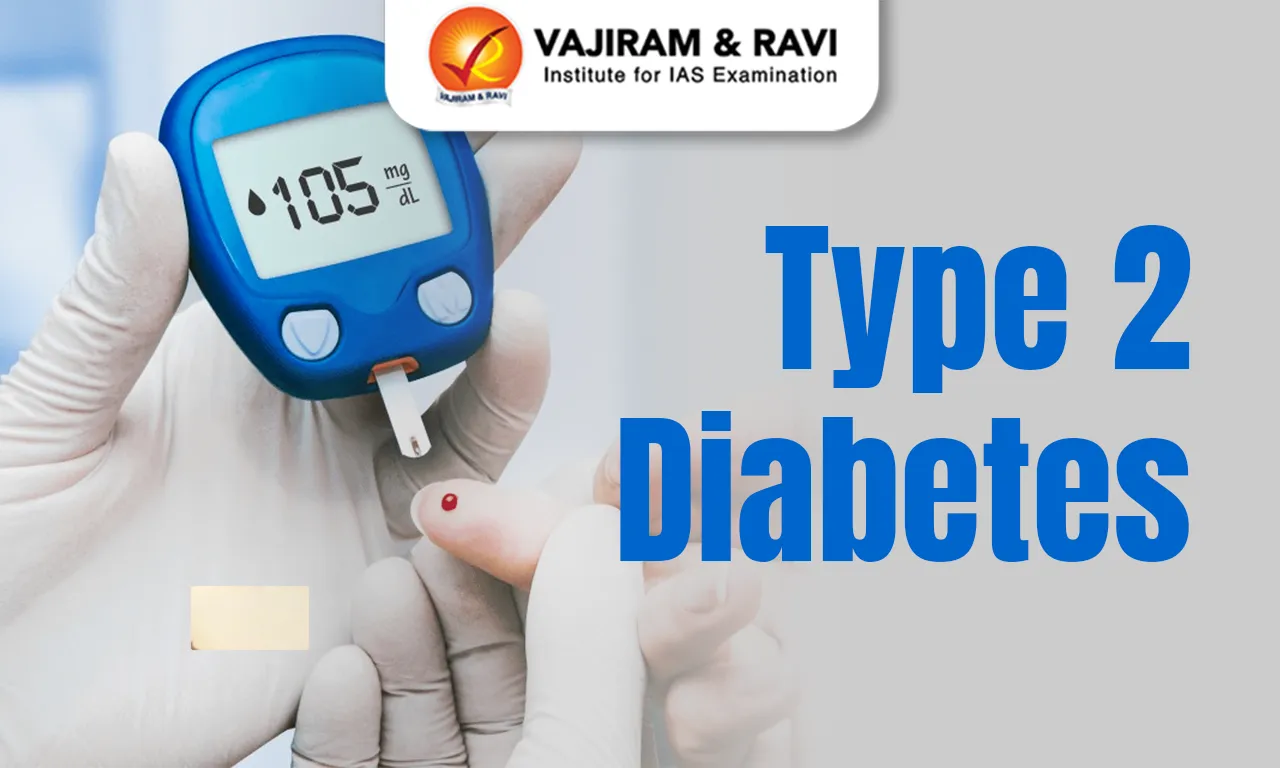Type 2 Diabetes Latest News
The CBSE has directed affiliated schools to establish “Sugar Boards” to monitor and reduce sugar consumption among students primarily to lower the risk of Type 2 diabetes and obesity in children.
About Type 2 Diabetes
- T2D, the most common type of diabetes, is a disease that occurs when your blood glucose, also called blood sugar, is too high.
- Blood glucose is your main source of energy and comes mainly from the food you eat.
- Insulin, a hormone made by the pancreas, helps glucose get into your cells to be used for energy.
- In T2D, your body doesn’t make enough insulin or doesn’t use insulin well.
- Too much glucose then stays in your blood, and not enough reaches your cells.
- Type 2 diabetes may be caused by a combination of factors:
- Being overweight or having obesity
- Not being physically active
- Genetics and family history
- How common is T2D?
- Researchers estimate that T2D affects about 6.3% of the world’s population.
- T2D most commonly affects adults over 45, but people younger than 45 can have it as well, including children.
Type 2 Diabetes Symptoms
- Many people with type 2 diabetes have no symptoms at all.
- If you do have them, the symptoms develop slowly over several years.
- They might be so mild that you do not notice them.
- The symptoms can include:
- Increased thirst and urination
- Increased hunger
- Feeling tired
- Blurred vision
- Numbness or tingling in the feet or hands
- Sores that do not heal
- Unexplained weight loss
Type 2 Diabetes Treatment
- Treatment for T2D involves managing your blood sugar levels.
- Many people are able to do this by living a healthy lifestyle.
- Some people may also need to take diabetes medicines, which may include pills or medicines you inject under your skin, such as insulin.
Type 2 Diabetes FAQs
Q1. What is the type 2 diabetes?
Ans. It is a disease that occurs when your blood glucose, also called blood sugar, is too high.
Q2. Which organ is responsible for producing insulin?
Ans. Pancreas
Q3. Is type 2 diabetes lifelong?
Ans. Type 2 diabetes is a lifelong (chronic) disease.
Source: FE
Last updated on February, 2026
→ UPSC Notification 2026 is now out on the official website at upsconline.nic.in.
→ UPSC IFoS Notification 2026 is now out on the official website at upsconline.nic.in.
→ UPSC Calendar 2026 has been released.
→ UPSC Final Result 2025 is expected to be released in the second week of April 2026.
→ Check out the latest UPSC Syllabus 2026 here.
→ Join Vajiram & Ravi’s Interview Guidance Programme for expert help to crack your final UPSC stage.
→ UPSC Mains Result 2025 is now out.
→ UPSC Prelims 2026 will be conducted on 24th May, 2026 & UPSC Mains 2026 will be conducted on 21st August 2026.
→ The UPSC Selection Process is of 3 stages-Prelims, Mains and Interview.
→ Prepare effectively with Vajiram & Ravi’s UPSC Prelims Test Series 2026 featuring full-length mock tests, detailed solutions, and performance analysis.
→ Enroll in Vajiram & Ravi’s UPSC Mains Test Series 2026 for structured answer writing practice, expert evaluation, and exam-oriented feedback.
→ Join Vajiram & Ravi’s Best UPSC Mentorship Program for personalized guidance, strategy planning, and one-to-one support from experienced mentors.
→ Check UPSC Marksheet 2024 Here.
→ UPSC Toppers List 2024 is released now. Shakti Dubey is UPSC AIR 1 2024 Topper.
→ Also check Best UPSC Coaching in India
Tags: prelims pointers type 2 diabetes upsc prelims current affairs




















